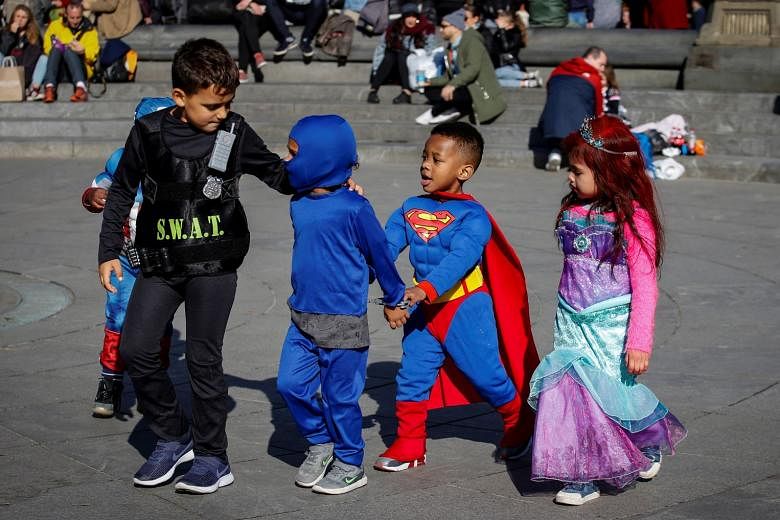NEW YORK • Your daughter is playing with a friend. Suddenly, the latter grabs her and pulls her into a big hug.
The adults around coo, take pictures and say: "Those two are definitely getting married one day."
Meanwhile, your daughter looks visibly uncomfortable as she waits for this physical contact to end.
The conversation about consent is ongoing worldwide, with a steady stream of stories about sexual harassment and assault in Hollywood, politics and the media.
When it comes to children, the emphasis has primarily been on consent between them and adults.
The Girls Scouts of America recently reminded parents that it is okay for kids to refuse a hug or kiss from a family member.
But when the affection is coming from another child, too often, it is seen as adorable and something that should be encouraged.
If parents want their kids to learn about consent and hope to teach them to respect others' body autonomy, it is crucial that they know that not all affection, however well-intentioned, is welcome.
Part of the issue is that affection is good and important for healthy child development. "You don't want to extinguish the affection that children show, but you do want to set appropriate limits," said Mr Eric Lindsey, associate professor of applied psychology at Pennsylvania State University-Berks Campus.
It is easy to tell a toddler "no", but not always easy to get him to listen. According to Mr Lindsey, the word "no" starts being effective between 12 and 18 months.
"We know that from a very early age, children can imitate and pick up on the emotional cues of others. The problem comes in using that information and they're really not good about using that information until around three," he added.
Ms Nancy Popson teaches three-year-olds at a nursery school in Maryland. She said as long as the affection shown by a child is mutual, she welcomes it.
However, she also encourages children to use words to tell their classmates what they want or need.
"If a child is uncomfortable with the affection from a classmate and is unsure what to say, I model some polite ways to decline affection, such as 'No thank you', 'I don't want to hug right now' or 'I don't feel like holding hands now'," she said.
Parental involvement and modelling behaviour is key, said sexuality expert Logan Levkoff.
She suggests parents build a foundation of consent by respecting their children's desires about affection, whether it comes from mum or dad, other adults or other kids.
When children get mixed messages, she noted, it is no surprise that they grow up to not respect boundaries.
This is especially true for "affection aggressors" - children who hug and kiss their peers without paying attention to whether that affection is unwanted.
Ms Katherine Martinelli's older son is an affection aggressor, frequently hugging other kids a little too long or too hard. "When I see my son going in for those big hugs, I always intervene," she said.
She talks about consent with both her sons, aged 31/2 and 10 months, frequently - in terms of giving and receiving - and reinforces the idea that when someone says no, it is important to stop.
In her classroom, Ms Popson encourages children to ask for permission, with words and gestures - offering a hand to hold or opening arms for a hug - but she also teaches kids how to handle it when their affection is rejected.
"I encourage her to show her love in other ways, such as telling her friend how she feels with words, drawing a picture for her friend and playing a favourite game with her friend."
Helping children learn healthy ways to express affection is important, but Mr Lindsey cautions that parents should not take it too far.
"Romantic and sexual behaviour in children is just not the same as in adults. It's largely due to curiosity and wanting to try out things that they've seen."
According to him, children should be able to recognise and react to verbal and non-verbal cues about affection by the age of five or six and parents should be concerned if the behaviour persists beyond that age.
By reminding children to ask first, stepping in when they forget, encouraging them to speak out when they are uncomfortable and having potentially awkward conversations with other parents on their behalf, parents can teach kids that consent matters, even when affection comes from a place of love.
WASHINGTON POST

